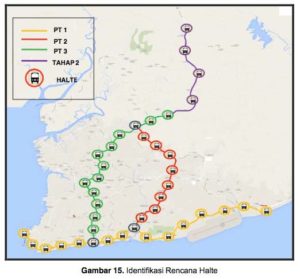
No public transport system currently exists in Balikpapan. Young people, the elderly and women are particularly inconvenienced by this, relying on others for their transportation needs. Balikpapan is now implementing the Monorail and Tram Project to meet the demands of the 700,000 inhabitants. The monorail and tram will pass through the most densely populated districts of the city where around 75 percent of city population reside. In addition, the central point of the new routes is a trade and service area in Balikpapan; it is therefore expected that the new infrastructure will increase mobility from the suburbs to the city center.
Balikpapan, Indonesia is implementing a transformative project that will contribute significantly to greenhouse gas emissions reductions while generating substantial co-benefits. The Monorail and Tram Project will provide two new services: one entirely separate from the current transport infrastructure and the other integrated into it. The central point of the new routes, Klandasan, is a trade and service area in Balikpapan; it is therefore expected that the new infrastructure will increase mobility from the suburbs to the city center.
The economic benefits of this project include shorter travel times for the public and reduced transport costs for the public. However, the social benefits are just as important.
Young people, the elderly and women in particular will benefit from the Monorail and Tram Project, as they are currently reliant on others for their transportation needs. This can result in dangerous situations, such as children and women riding on the back of motorcycles, often without helmets. In addition, the poor and unemployed will benefit from a reliable and affordable mode of transportation and the creation of temporary and permanent employment opportunities. (Source: ICLEI http://talkofthecities.iclei.org/redefining-city-life-through-equity-in-climate-action/)